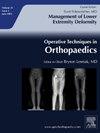Optimizing the Orthopaedic Trauma Patient- Staged Management
IF 0.3
Q4 ORTHOPEDICS
引用次数: 0
Abstract
Staged management of orthopedic trauma is employed to promote best outcomes and avoid known complications associated with acute definitive fracture reconstruction. Fracture in the setting of polytrauma is often initially managed with temporizing methods to allow for both optimization of the host and local soft tissue environment. Damage control orthopedics has promoted this strategy to delay definitive care of orthopaedic injuries based on the patient's level of resuscitation/inflammatory state. Further, staged care of peri-articular fracture respects the already traumatized soft tissue envelope in an effort to decrease the risk of infamous complications such as infection and fracture nonunion. Typically, external fixation is utilized in staged management and host optimization is performed in the “waiting period.”
优化骨科创伤患者--分阶段管理
骨科创伤采用分阶段管理,以促进最佳治疗效果,并避免与急性明确骨折重建相关的已知并发症。在多发性创伤的情况下,骨折最初通常采用暂时性方法进行处理,以优化宿主和局部软组织环境。损伤控制骨科提倡这一策略,即根据患者的复苏水平/炎症状态推迟骨科损伤的明确治疗。此外,对关节周围骨折的分期治疗尊重已受创伤的软组织包膜,以降低感染和骨折不愈合等恶性并发症的风险。通常情况下,在分期治疗中使用外固定,而在 "等待期 "进行宿主优化。
本文章由计算机程序翻译,如有差异,请以英文原文为准。
求助全文
约1分钟内获得全文
求助全文
来源期刊

Operative Techniques in Orthopaedics
ORTHOPEDICS-
CiteScore
0.40
自引率
0.00%
发文量
40
审稿时长
83 days
期刊介绍:
Operative Techniques in Orthopaedics is an innovative, richly illustrated resource that keeps practitioners informed of significant advances in all areas of surgical management. Each issue of this atlas-style journal explores a single topic, often offering alternate approaches to the same procedure. Its current, definitive information keeps readers in the forefront of their specialty.
 求助内容:
求助内容: 应助结果提醒方式:
应助结果提醒方式:


